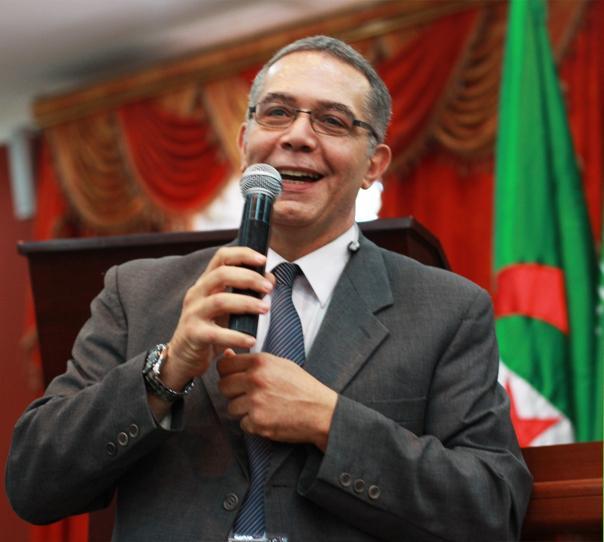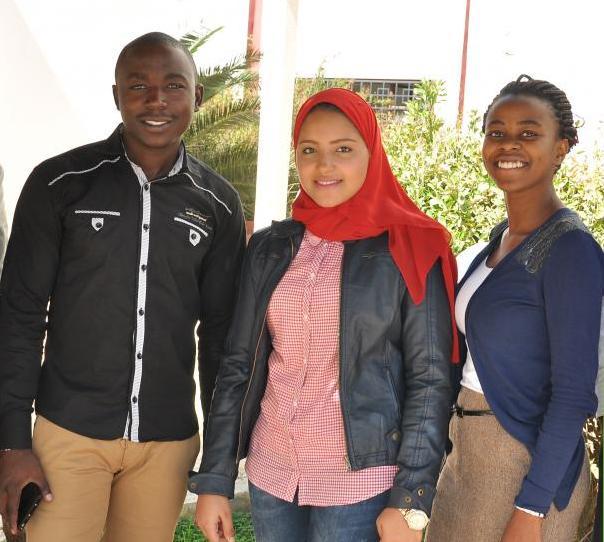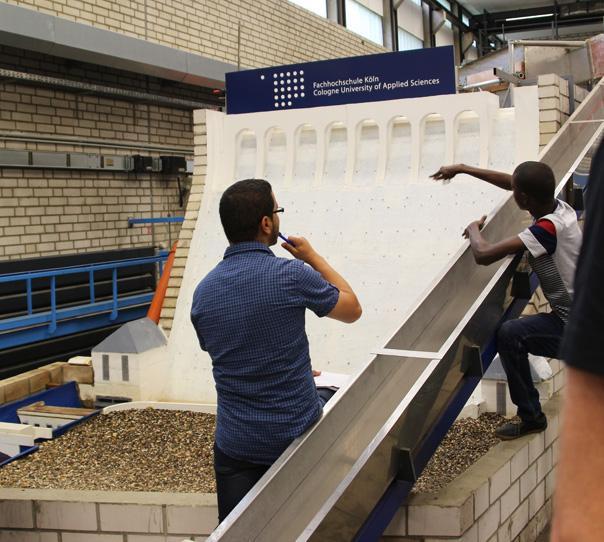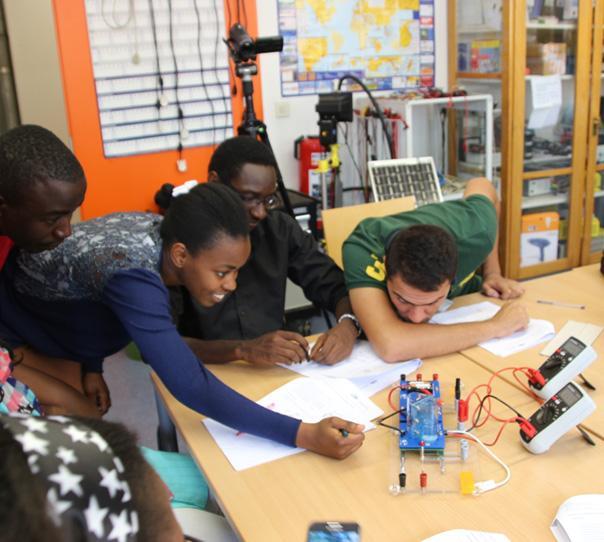Welcome To PAUWES
The PAUWES CoP is the effort to connect PAUWES stakeholders virtually so they can interact, communicate, collaborate and network online. The platform offers ...
Profile, Networking and Interaction
Profile and Vitae of students at PAUWES, profiles of scientists and lecturers at PAUWES, international scientists and experts in the areas of water, energy and climate change
News, Exchange and discussion
Blogs and one stop shop for news related to energy and water, aggregating information from several sources (portal, social media, etc.)
Chat and Instant messaging
Public and private groups, forums, event calendar, document management, etc.
Multimedia content with respect to energy, water and climate change
Chat and Instant messaging
Public and private groups, forums, event calendar, document management, etc.
Multimedia content with respect to energy, water and climate change
Organization/Companies and Job Databases
Database, contact and direct interaction with non-governmental organizations, think thanks, research institutions, international and Pan-African networks in the energy, water and climate change nexus
Database of companies, jobs and internships
Database of companies, jobs and internships
Events and Webinars
Database of interesting events with regards to the energy, water and climate change nexus
Live events such as online lectures and webinars with international experts as well as digital archives of past events
Live events such as online lectures and webinars with international experts as well as digital archives of past events
News
-
As the COVID-19 pandemic wreaks havoc throughout the world, badly hitting both our health systems and economies, it also offers hope. It is lighting a tunnel that could boost the achievement of the African Union's Agenda 2063. The agenda, which is rooted in the ideals of Pan Africanism and is geared towards "an integrated, prosperous and peaceful Africa, driven by its citizens," has the African youth at its core. Young entrepreneurs in many African countries are challenged with inadequate support for their startups and are left vulnerable to stiff competition from international brands. In many cases, their businesses fail. Available statistics show that five out of ten enterprises close down in the first five years of operation [1]. Many reasons are behind this crash like poor planning, insufficient marketing, lack of management skills which leads to funding mismanagement, high-interest rate, and poor aftersales services. Consequently, the idea of incubating small enterprises and early-stage business is very crucial. And nowadays across the continent, we have many incubators that offer technical consultancy and some seed funding. These actions will help small startups to stand on their own if supportive legal and regulatory frameworks are put in place. The COVID-19 pandemic has brought sprout up of the African industry. It was the stone that waves the water again and unleashes nationalism idea. In Egypt, for example, a private company designed and manufactured sterilization tunnels locally, and the government bought them [2]. The tunnels will be placed on the hospitals' entrance and exit to disinfect supplies and humans. Figure 1: EGIC Sterilization tunnels The same thing happened in Tunisia, where the government creates a partnership with a local company that manufactures security robotics. The robots were deployed to enforce lockdown restrictions and ensure that the citizens obey the rules. Where people are found to flout the rules, the robot relays their identification to the police for follow-ups and where necessary arrests [3]. Figure 2: Tunisian security robot Also, students at the Kwame Nkrumah University of Science and Technology in Ghana have innovated a low-price ventilator [4]. Why can the Ghanaian government not support them to produce it in larger quantities and supply it to hospitals? Promoting them will also tackle the problem of unemployment, and in so doing, the government gets to kill two birds with the same stone. Even for the portable smart hand wash prototype in Benin [5]. Such a thing is crucial to be put in our crowded vegetable markets, so why not encourage mass production and supply it to the public? These and many others, such as the development of fast and cheaper testing kits as seen in Senegal and Ghana, are but few examples that demonstrate the innovative potentials in Africa. Figure 3: Low price ventilator made in Ghana For a long time now, we here in Africa have overly depended on foreign products, and producing our goods hasn't been a topmost priority for our leaders. But with this pandemic, we have become obliged to manufacture our products, and it will be useful to make it a trend to produce the things that we need. This approach will not just empower the youth but will also help us to reach the Africa We Want. One of Agenda 2063 pillars is the high quality of life for Africans, so how can we achieve it with a high unemployment rate? The agenda aims to transform African economies by building industries and value addition. Perhaps, this is our opportunity to take charge of our development and catch up with developed countries. References [1]https://www.forbes.com/sites/forbesfinancecouncil/2018/10/25/what-percentage-of-small-businesses-fail-and-how-can-you-avoid-being-one-of-them/ [2]https://www.linkedIn/EGIC [3] https://www.bbc.com/news/world-africa-52148639 [4]https://newsghana.com.gh/knust-coe-designs-and-construct-ghanas-first-homemade-ventilator/ [5]https://www.youtube.com/watch?v=IjL3FplLl-c Author Profiles 1. Rana is a MSc. Energy Engineering graduate from PAUWES. 2. Ihemnadia is a MSc. Energy Engineering graduate from PAUWES.17275 Posted by Rana Mamdouh
-
Why the fight for gender equality must be one and the same for COVID-19 and Climate Change. Published on 26/04/2020 By: Mark Akrofi and Rana Mamdouh The unprecedented impact of COVID-19 is being felt across the globe. Whiles many governments are mapping out strategies to get their economies back on track, care must be taken to ensure that the plight of vulnerable groups is not worsened by the pandemic. Just like climate change, COVID-19 is affecting everyone in society but it is the world’s poorest and most vulnerable, especially women and girls who will likely suffer the most from its socio-economic impacts [1]. In Africa and many developing parts of the world, women and girls are predominantly responsible for food production, household water and energy (mostly fuelwood) supply for cooking. The presence of climate change has already made these tasks difficult with women spending longer periods in search of water and fuelwood, especially in rural and peri-urban areas. Consequently, their productive hours are reduced and the extended periods spent on doing unpaid care work has further deepened inequalities between women and men. Photo by 2Photo Pots on Unsplash The outbreak of COVID-19 has made this situation even worse. In sub-Sarah Africa where 89% of women are employed in the informal sector [2], lockdown measures imposed across countries have resulted in the closure of markets thus, pushing many women out of employment. Confined to their homes and with the closure of schools, women’s unpaid care work, especially for children and the elderly, has increased. This confinement has also brought a spate of heightened domestic violence against women [3]. Stress and anxiety, coupled with restricted movements and isolation due to COVID-19 have already raised serious concerns about people’s mental health. Whiles both men and women are likely to suffer from mental health issues, women may be more susceptible due to the round the clock work that they do in their homes and their exposure to domestic violence. Today, as countries begin to ease lockdown restrictions with the reopening of some business and the return to normal life is in sight, hope is beginning to return to many who are itching to get back to work and start earning again. However, with schools still closed, this gradual easing of restrictions holds little prospects for reducing gender inequalities (perhaps in the short term) since many women have to stay at home to cater for their children or spend a considerable part of their productive time doing so before going to work. This situation is one that potentially deepens inequalities between women and men. Many government aid packages are targeting small business but what about the thousands of women engaged in informal activities that are not formally registered? COVID-19 may end soon but climate change is far from over. How can women safeguard their health and livelihoods in the face of COVID-19 and climate change? How can we avoid aggravated gender inequalities caused by COVID-19 and climate change? Photo by Eva Blue on Unsplash Whiles governments are laying out strategies to get businesses back on track, investment in social safety nets is needed now more than ever to safeguard the livelihoods and well-being of women during and after the pandemic. Governments must recognize that the fight for gender equality is one and the same for both climate change and COVID19. Access to modern energy services during this lockdown period is very crucial whiles equal representation of women in the fight against climate change is as important as equal representation of women in the fight against the pandemic. The United Nations Populations Fund (UNFPA) [4] warns that inadequate representation of women is already evident in some countries’ planning and response to the pandemic. Governments must also strengthen the activities of NGOs and CSOs who are empowering women, fighting gender-based violence and advocating for gender equality at the grassroots. Such groups need to be empowered to bolster their efforts in creating awareness, reporting incidences of domestic violence, advancing reproductive health rights, and creating supportive networks to help cope with stress during this challenging period. It is imperative that the fight against COVID-19 does not overshadow the fight against climate change. Gender is a cross-cutting issue and it needs to be mainstreamed in all COVID-19 and climate change response efforts in order to avoid a double tragedy of heightened gender inequalities in Africa. Author Profiles 1. Mark is a MSc. Energy Policy graduate from PAUWES. He is co-founder and former vice president of the PAUWES Climate Change and Gender Club. Contact Mark 2. Rana is a MSc. Energy Engineering graduate from PAUWES. She is a member of the PAUWES Climate Change and Gender Club. Contact Rana7166 Posted by Mark Akrofi





